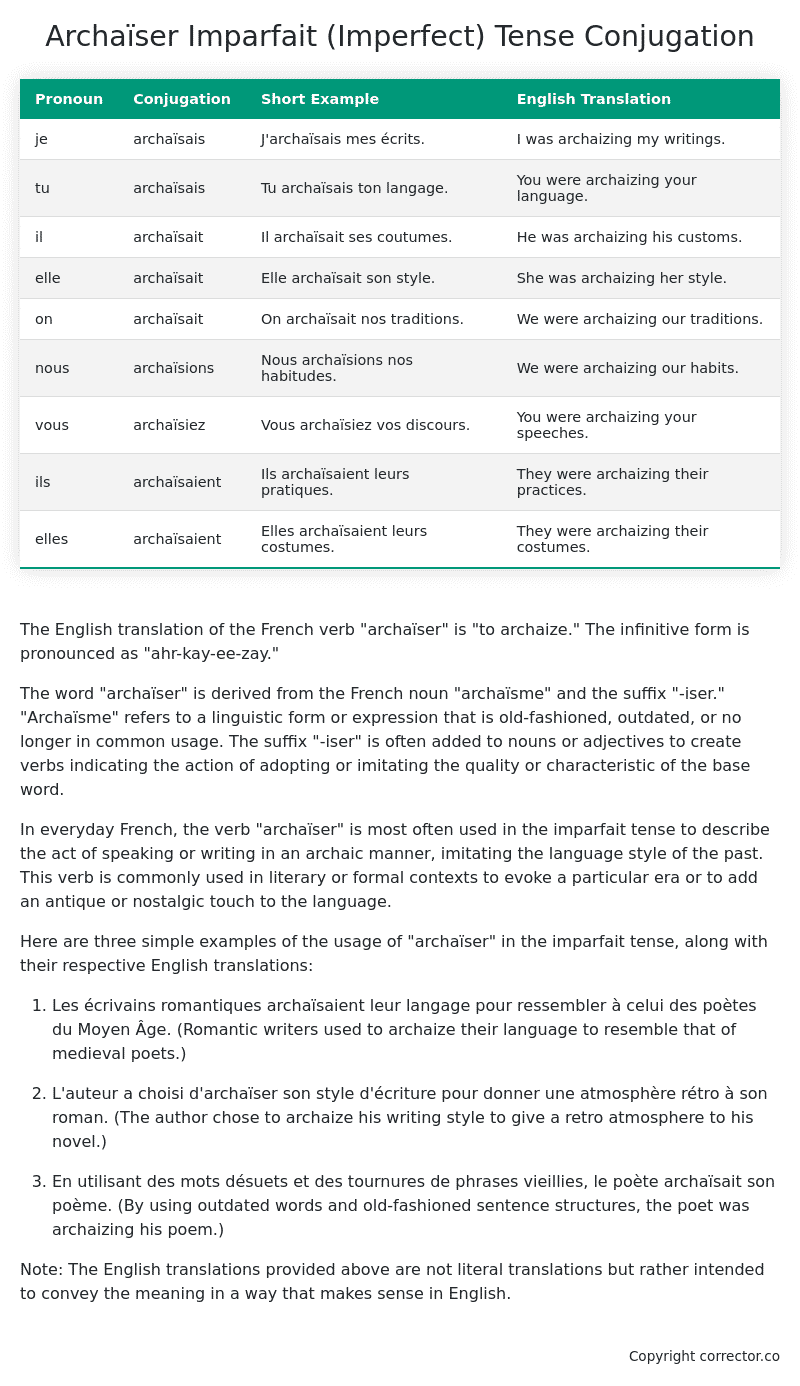Imparfait (Imperfect) Tense Conjugation of the French Verb archaïser
Introduction to the verb archaïser
The English translation of the French verb “archaïser” is “to archaize.” The infinitive form is pronounced as “ahr-kay-ee-zay.”
The word “archaïser” is derived from the French noun “archaïsme” and the suffix “-iser.” “Archaïsme” refers to a linguistic form or expression that is old-fashioned, outdated, or no longer in common usage. The suffix “-iser” is often added to nouns or adjectives to create verbs indicating the action of adopting or imitating the quality or characteristic of the base word.
In everyday French, the verb “archaïser” is most often used in the imparfait tense to describe the act of speaking or writing in an archaic manner, imitating the language style of the past. This verb is commonly used in literary or formal contexts to evoke a particular era or to add an antique or nostalgic touch to the language.
Here are three simple examples of the usage of “archaïser” in the imparfait tense, along with their respective English translations:
-
Les écrivains romantiques archaïsaient leur langage pour ressembler à celui des poètes du Moyen Âge.
(Romantic writers used to archaize their language to resemble that of medieval poets.) -
L’auteur a choisi d’archaïser son style d’écriture pour donner une atmosphère rétro à son roman.
(The author chose to archaize his writing style to give a retro atmosphere to his novel.) -
En utilisant des mots désuets et des tournures de phrases vieillies, le poète archaïsait son poème.
(By using outdated words and old-fashioned sentence structures, the poet was archaizing his poem.)
Note: The English translations provided above are not literal translations but rather intended to convey the meaning in a way that makes sense in English.
Table of the Imparfait (Imperfect) Tense Conjugation of archaïser
| Pronoun | Conjugation | Short Example | English Translation |
|---|---|---|---|
| je | archaïsais | J’archaïsais mes écrits. | I was archaizing my writings. |
| tu | archaïsais | Tu archaïsais ton langage. | You were archaizing your language. |
| il | archaïsait | Il archaïsait ses coutumes. | He was archaizing his customs. |
| elle | archaïsait | Elle archaïsait son style. | She was archaizing her style. |
| on | archaïsait | On archaïsait nos traditions. | We were archaizing our traditions. |
| nous | archaïsions | Nous archaïsions nos habitudes. | We were archaizing our habits. |
| vous | archaïsiez | Vous archaïsiez vos discours. | You were archaizing your speeches. |
| ils | archaïsaient | Ils archaïsaient leurs pratiques. | They were archaizing their practices. |
| elles | archaïsaient | Elles archaïsaient leurs costumes. | They were archaizing their costumes. |
Other Conjugations for Archaïser.
Le Present (Present Tense) Conjugation of the French Verb archaïser
Imparfait (Imperfect) Tense Conjugation of the French Verb archaïser (You’re reading it right now!)
Passé Simple (Simple Past) Tense Conjugation of the French Verb archaïser
Passé Composé (Present Perfect) Tense Conjugation of the French Verb archaïser
Futur Simple (Simple Future) Tense Conjugation of the French Verb archaïser
Futur Proche (Near Future) Tense Conjugation of the French Verb archaïser
Plus-que-parfait (Pluperfect) Tense Conjugation of the French Verb archaïser
Passé Antérieur (Past Anterior) Tense Conjugation of the French Verb archaïser
Futur Antérieur (Future Anterior) Tense Conjugation of the French Verb archaïser
Subjonctif Présent (Subjunctive Present) Tense Conjugation of the French Verb archaïser
Subjonctif Passé (Subjunctive Past) Tense Conjugation of the French Verb archaïser
Subjonctif Imparfait (Subjunctive Imperfect) Tense Conjugation of the French Verb archaïser
Subjonctif Plus-que-parfait (Subjunctive Pluperfect) Tense Conjugation of the French Verb archaïser
Conditionnel Présent (Conditional Present) Tense Conjugation of the French Verb archaïser
Conditionnel Passé (Conditional Past) Tense Conjugation of the French Verb archaïser
Conditionnel Passé II (Conditional Past II) Tense Conjugation of the French Verb archaïser
L’impératif Présent (Imperative Present) Tense Conjugation of the French Verb archaïser
L’impératif Passé (Imperative Past) Tense Conjugation of the French Verb archaïser
L’infinitif Présent (Infinitive Present) Tense Conjugation of the French Verb archaïser
L’infinitif Passé (Infinitive Past) Tense Conjugation of the French Verb archaïser
Le Participe Présent (Present Participle) Tense Conjugation of the French Verb archaïser
Le Participe Passé (Past Participle) Tense Conjugation of the French Verb archaïser
Struggling with French verbs or the language in general? Why not use our free French Grammar Checker – no registration required!
Get a FREE Download Study Sheet of this Conjugation 🔥
Simply right click the image below, click “save image” and get your free reference for the archaïser imparfait tense conjugation!

Archaïser – About the French Imparfait Tense
NOTE: To take a deep dive into all the French tenses then see our article on Mastering French Tense Conjugation.
Formation of the Imparfait Tense
For regular -er verbs:
For regular -ir verbs
For regular -re verbs
Common Everyday Usage Patterns
Description of Past Habits
Background Information
Mental and Emotional States
It’s employed to express emotions, thoughts, or physical sensations in the past. For example: “J’étais content quand il est arrivé.” (I was happy when he arrived.)
Ongoing Actions
Points to Note About the Imparfait Tense
Passé Composé vs. Imparfait
Conditional
Si Clauses
Narration
I hope you enjoyed this article on the verb archaïser. Still in a learning mood? Check out another TOTALLY random French verb imparfait conjugation!


